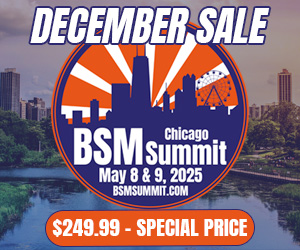“What’s the hardest part of the job?”
That question was posed to me last week by someone who’d never been in the industry. My answer was simple: “the maybe’s and the roller coaster.”
As much as I hate no, and believe me I HATE no, I hate maybe even more. No saves me time. Once I’ve challenged the no (you’re all challenging the no before walking away, right?), and feel the no really means no, I can move on. With a maybe, I have precious head space filled with a strong combination of cautious optimism and concern while wondering if I’m overanalyzing the situation as I continuously think of how to breathe life in to a deal I feel is slipping away while mapping out new strategies to get the deal closed (sound familiar to anyone?).
Maybe’s are the worst. I remember still learning how to sell when a manager looked me in the eye and said: “Cross that one off your list, they’ve been saying maybe for a year!” Often times, maybe is really being disrespectful of our time – it’s someone who doesn’t want to hurt our feelings by saying no, or who just enjoys being chased. None of us have time for that. Find a way to get the objections and answer them, but if the list of objections just continues to grow, find better use of your time.
I believe a big part of what has made me successful in the industry is that, over time, I’ve come to have a much better feel for what is a “maybe yes” and what is a “maybe no.” But, either way, I still hate the “maybe’s.”
The roller coaster is the part that will make or break someone in this business. I have discussed before that when hiring, the unknown is how people will handle the grind and the obstacles six months or a year down the road. It’s that roller coaster that’s the main culprit. Is the person you’ve brought in someone who can handle the constant ups and downs of our world? How can you really know until they’ve faced it and you watch it unfold?
If you can avoid getting too high when the orders are falling out of the sky, and too low when every well seems to be dried up, you’ll be set up much better to succeed. I’ve seen too many people come through who start high-fiving and dancing before the signature comes in and then end up needing psychiatric help when the deal falls apart. It happens. Welcome to sports radio sales. Now, go sell something.
I’ve always told sales teams they should assume they’re about to lose their largest account. Therefore, if, and when, it ever happens, it’s not a surprise. Be prepared for it, but most of all, have things in your pipeline that will replace it.
I had a situation once where a top five client gave notice of cancellation. I had had a bad feeling about the account and thought the AE shared my concern. I had gone as far as already thinking of replacements for the sponsorship the advertiser had. When the notice came in and our attempt at saving it fell short, the AE was crushed and came in my office a few times to vent frustrations before finally saying: “What do you think we should do?” I said, “There’s only one thing we can do – go sell it to someone else.”
I was just as disappointed as the AE that we’d lost the account, but I’d learned long ago that being overly upset about things wasn’t going to change anything. What makes it better is to go make a sale and get that winning feeling back. It’s like the closer who blows the save – the best thing they can do is to get right back after it the next night and get their mojo back.
There’s no better feeling than the wins, no worse feeling than the losses and the maybe’s will drive you nuts. Learning to balance this emotional roller coaster will make you a much more successful seller and then perhaps it won’t always be one of the hardest parts of the job.
PS – I would love to feature some outstanding sports sellers in future columns. If you manage a staff and have someone working for you who you believe deserves recognition or if you’re a seller with a good story to share, please email me david.greene@entercom.com.

Dave Greene is the Chief Media Officer for Barrett Media. His background includes over 25 years in media and content creation. A former sports talk host and play-by-play broadcaster, Dave transitioned to station and sales management, co-founded and created a monthly sports publication and led an ownership group as the operating partner. He has managed stations and sales teams for Townsquare Media, Cumulus Media and Audacy. Upon leaving broadcast media he co-founded Podcast Heat, a sports and entertainment podcasting network specializing in pro wrestling nostalgia. To interact, find him on Twitter @mr_podcasting. You can also reach him by email at Dave@BarrettMedia.com.





